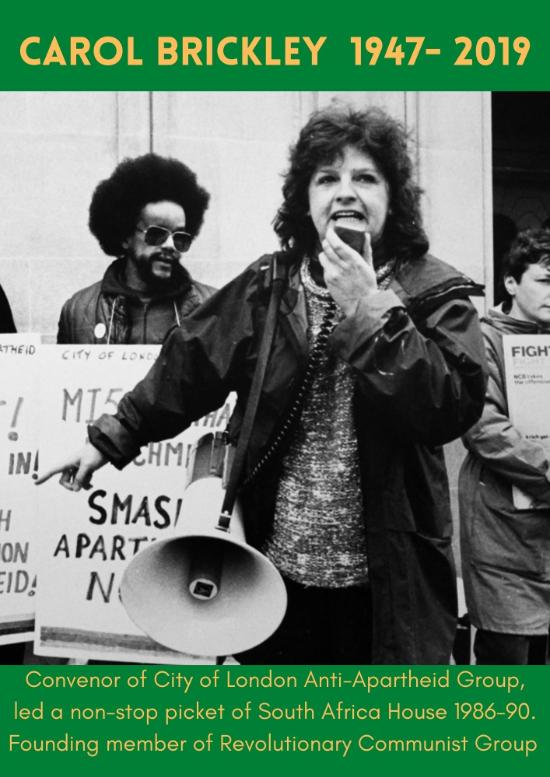Helen Crawfurd 1877-1954
Helen Crawfurd was a communist and a Scottish suffragette who engaged in direct action, smashing the windows of the Minister of Education’s residence in central London, blocking arrests of other suffragettes and allegedly bombing the Botanic Gardens in Glasgow. She was regularly imprisoned for these activities. When the first imperialist war broke out, she split with the Women’s Social and Political Union over its support for British involvement in the war and instead joined the Women’s Peace Party and Independent Labour Party, organising Scottish women in a campaign to oppose Britain’s war drive.
In early 1915, the landlords of Glasgow implemented a series of rent increases and evictions against tenants. With thousands of workers flooding into the city’s workshops and shipyards for war production, housing shortages were severe. The vast majority of people lived in terrible conditions, in one or two room houses in dilapidated tenements at the highest density in Britain. All workers’ dwellings were privately owned and the landlords seized the opportunity offered by the war. Rents were raised and eviction orders issued against tenants unable to pay. In response, the working class women of the tenements refused to pay and initiated a rent strike which was to force the British government to place on the statute book the first ever controls restricting rents. It was the women of the tenements, not the men of the factories, who took up the struggle against the landlords and in doing so transformed the class struggle on the Clyde.
Within a few months 15,000 families were refusing to pay rent. Under the legendary leadership of Mary Barbour and the Govan housewives of ‘Barbour’s Army’, support was mobilised across every section of the labour movement on Clydeside. Helen Crawfurd, became secretary of the Glasgow Women’s Housing Association. She led the rent strike and rallied working class women to the anti-war cause, founding the Women’s Peace Crusade. Through the summer and autumn of 1915, the whole working class movement on Clydeside was given impetus by the rents campaign. The Glasgow schoolteacher John Maclean was by now attracting thousands of workers to weekly meetings on Bath Street, where he thundered against war and called for revolutionary action against the warmongers. He combined this with relentless organisation building support for the rent strikers at dinner-hour meetings at the shipyard gates. Everywhere mass demonstrations, local meetings and factory assemblies were taking up questions of rent, conscription and workplace control as the terrible slaughter of war proceeded.
What had begun as a localised dispute over rent increases had by autumn 1915 been transformed into a genuine threat to the British state. Glasgow was the most important centre of war production in the empire. The British government was forced to act. Munitions Minister Lloyd George dispatched official representatives to investigate the rent question and continuing threats of unofficial action over three jailed shipwrights. Eighteen workers appeared in court faced with eviction warrants and the recovery of rent arrears in the Small Debts Court. The court case was the occasion for a festival of working-class resistance and solidarity, one of the greatest demonstrations in Glasgow’s history. Workers from at least five shipyards, one munitions factory and the Albion motor works downed tools and joined the demonstration in front of the court. Thousands of women, workers and children marched to George Square as John Maclean was carried by strikers from his school in Govan and Mary Barbour addressed the crowds. War production on the Clyde would be brought to a halt immediately if the case was not resolved favourably. The ruling class acted swiftly. Prime Minister Lloyd George instructed that the case against the 18 workers be dropped. By early December 1915, parliament rushed through the Rent Restrictions Act, controlling rents to pre-war levels for the duration of the war and beyond. A famous victory was won.
Helen Crawfurd, addressing a protest in support of prosecuted tenants, stated: ‘this fight was essentially a woman’s fight. All who were taking part in the demonstration were showing their solidarity. They were asking not for money, not for charity; they were asking for justice…’
After the rent strike victory, Crawfurd became disillusioned with the Independent Labour Party and after meeting Lenin at the second congress of the third international, she co-founded the Communist Party of Great Britain. She edited a separate women’s page in the official newspaper of the CPGB, The Communist, played a leading role in the Workers International Relief Organisation and helped to establish the League against Imperialism.
(For more on the Glasgow Rent Strike, see https://www.revolutionarycommunist.org/branches/85-imperialism-and-crisis/4092-grs200815. See also https://ycl.org.uk/2019/02/10/international-womens-day-2019-helen-crawfurd/)





